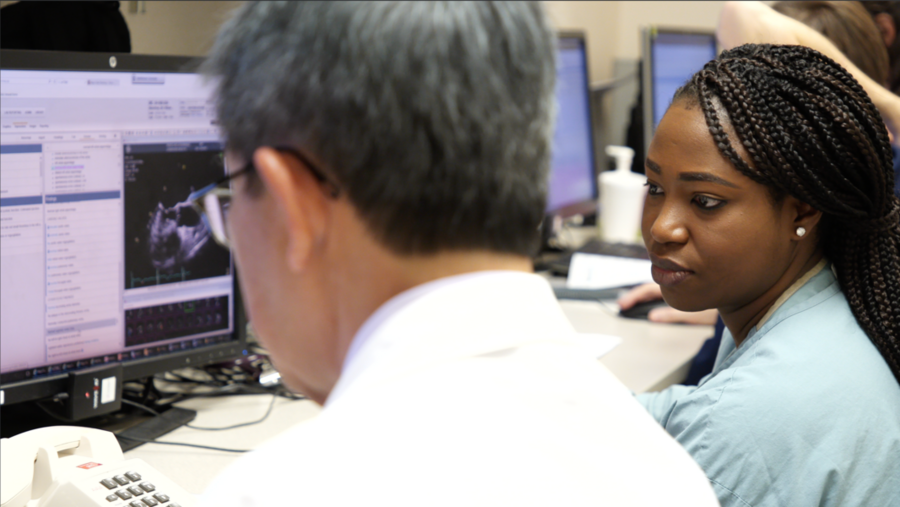I am a non-invasive cardiologist and assistant professor of medicine at Mayo Clinic, Florida. My clinical interests are in women’s cardiovascular health and echocardiography, and my research interests are in cardiovascular epidemiology, cardiovascular disparities and the use of artificial intelligence in cardiovascular disease management.
My interest in artificial intelligence uses in cardiology developed towards the end of my clinical fellowship training in 2019. I had the opportunity to work with clinical and research mentors who were investigating the use of deep learning models to detect cardiac abnormalities.
I subsequently worked with this team to evaluate an ECG-based deep learning model to detect cardiac dysfunction among patients seen in the emergency room with shortness of breath. Our results were published in the journal Circulation: Arrhythmia & Electrophysiology. We also evaluated this model among pregnant and postpartum women with great results.
This certificate program was instrumental in helping me understand the essential concepts in machine learning (ML) and types of ML with practical and real-life examples of how these models are used and interpreted. Through this program, I am better able to formulate appropriate clinical research questions that can be addressed with machine learning. And also review and understand published scientific literature based on ML that is related to cardiovascular medicine.

Cardiologist Dr. Demilade Adedinsewo (right) is a Mayo Clinic Florida Women's Health Scholar whose research interests include the use of digital tools in cardiovascular disease management. Image Credit: Mayo Clinic.
You have completed nine courses in total with MIT Professional Education, including AI Strategies and Roadmap. What are some of the key takeaways from some of the nine courses?
The classes I attended were very organized and usually started with the basics, gradually diving into more complicated concepts and mathematical equations. One of the classes I particularly enjoyed was Ethics of AI: Safeguarding Humanity. This class brought things home for me, given my interest in cardiovascular disease disparities.
One of the things I was hoping for in pursuing this course was leveraging machine learning to improve health equity. While some of that is true, what I also discovered through my classes was how AI can propagate bias and reinforce inequalities on a larger scale.
I also learned that efforts to prevent bias must be intentional, including ensuring that training datasets are inclusive and models are rigorously tested and validated - what is referred to as responsible AI. I also got my first introduction to philosophy through one of my classes as part of this certificate program. I was able to visualize the “trolley problem dilemma” when it was discussed in class, partly thanks to watching a Netflix show “The Good Place” where the trolley problem was enacted in motion picture.
Can you provide an insight into the testing that was carried out as part of your ECG project?
The model utilized in my study was a convolutional neural network. It was trained and validated on approximately 100,000 patients at Mayo Clinic, with paired electrocardiogram and echocardiogram results. My team and I sought to evaluate the effectiveness of this model in a clinical setting – the emergency room, where rapid patient evaluation and diagnosis is important.
What were the findings from this ECG study?
Among 1,606 patients evaluated in the emergency room for shortness of breath, we found the trained neural network could accurately predict the likelihood of cardiac dysfunction. It also outperformed the current standard of care test (a blood test) used to screen patients in the emergency room for cardiac dysfunction.
What are some of the key benefits of AI-enhanced electrocardiograms (ECGs) when compared to conventional ECGs?
AI-enhanced ECGs have demonstrated novel diagnostic capabilities beyond what human readers (cardiologists) can glean from the ECG. The performance of the AI-ECG for cardiovascular disease detection has also been truly remarkable when compared to some of the standard clinical diagnostic tests we use in day-to-day practice.
Some examples based on models developed at Mayo Clinic include the detection of cardiac dysfunction (low cardiac ejection fraction), silent atrial fibrillation (on an apparently normal ECG), hypertrophic cardiomyopathy, aortic stenosis and cardiac amyloidosis. All of these with AUCs ranging from 0.85 – 0.95. The ECG is also relatively inexpensive and widely available, making it an ideal screening test in large populations or resource-poor settings.
What are your predictions for the future in terms of the use of AI in health care? What developments do you expect to see in the next 5 to 10 years?
In the next 5 – 10 years, I believe that AI will change the way we practice medicine by enhancing currently available diagnostic tools, developing accurate clinical decision support tools, advancing precision/individualized medicine, and improving physician efficiency and patient outcomes.
We are already beginning to see scientific evidence supporting this. Our task now is to start moving toward rigorous validation of AI-based tools, implementation science and eventually guideline and clinical practice changes. I am also hopeful that embracing AI tools in cardiology can and will improve health care equity.
Where can readers find more information?
Your readers can find links to relevant articles here:
Artificial Intelligence-Enabled ECG Algorithm to Identify Patients With Left Ventricular Systolic Dysfunction Presenting to the Emergency Department With Dyspnea
Detecting cardiomyopathies in pregnancy and the postpartum period with an electrocardiogram-based deep learning model
An Easy Screen for Left Ventricular Dysfunction
Screening for cardiac contractile dysfunction using an artificial intelligence–enabled electrocardiogram
There is also a Q & A podcast in which I discuss how AI is improving patient care in the emergency department.
About Dr. Demilade Adedinsewo
 Dr. Adedinsewo is a non-invasive cardiologist and assistant professor of medicine at Mayo Clinic, Florida, with special interests in women's heart health, cardiovascular disease prevention, cardiovascular health disparities and the use of digital tools in cardiovascular disease management. Dr. Adedinsewo is currently a Mayo Clinic Florida Women's Health Scholar and functions as the Director of Research for the Women's Heart Clinic and the Cardiovascular Disease Fellowship program. Dr. Adedinsewo is a heart health advocate and works closely with the American Heart Association on cardiovascular disease awareness and health education.
Dr. Adedinsewo is a non-invasive cardiologist and assistant professor of medicine at Mayo Clinic, Florida, with special interests in women's heart health, cardiovascular disease prevention, cardiovascular health disparities and the use of digital tools in cardiovascular disease management. Dr. Adedinsewo is currently a Mayo Clinic Florida Women's Health Scholar and functions as the Director of Research for the Women's Heart Clinic and the Cardiovascular Disease Fellowship program. Dr. Adedinsewo is a heart health advocate and works closely with the American Heart Association on cardiovascular disease awareness and health education.
Additional career highlights (education, activities, publications and professional memberships) can be found here.
Banner image credit: Mayo Clinic, Florida
Disclaimer: The views expressed here are those of the interviewee and do not necessarily represent the views of AZoM.com Limited (T/A) AZoNetwork, the owner and operator of this website. This disclaimer forms part of the Terms and Conditions of use of this website.